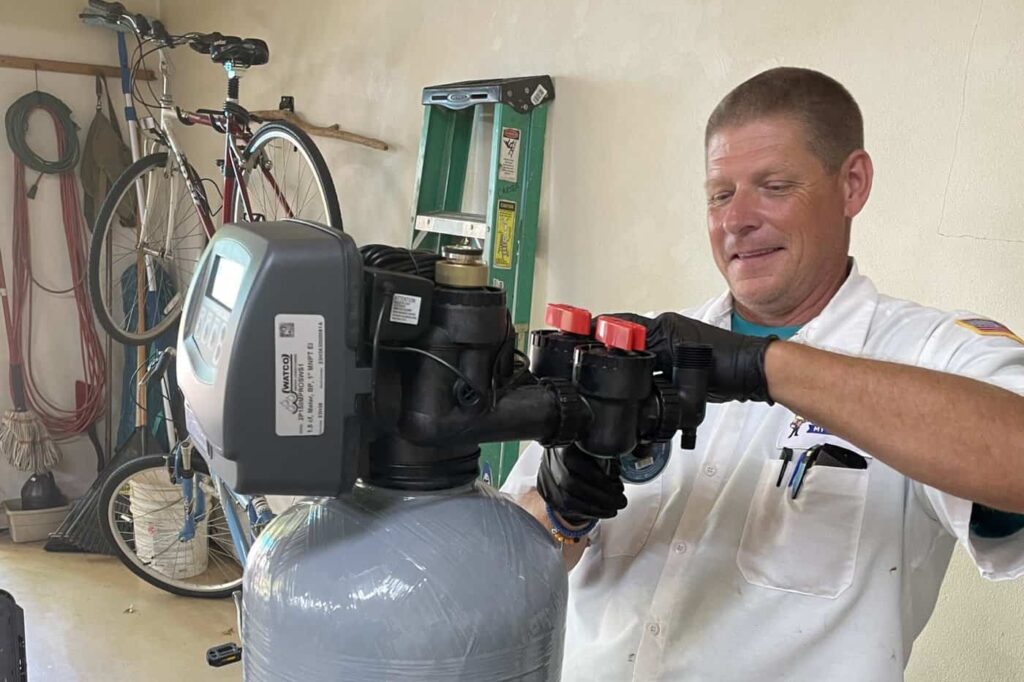Table of Contents
If you live in an area where the local water supply has a heavy mineral content, you may determine that it’s best to install a water softener. Among its many benefits, a good water softener can improve the quality of your drinking water considerably.
But what does it mean when you install a water softener and find that your drinking supply hasn’t become more appealing, but less? One issue that you may encounter is discolored water, specifically yellow water. Naturally, you’re going to think twice before taking a sip, let alone downing an entire glass. But what are the potential causes of yellow water? And what can be done to resolve the problem?
At Carter’s My Plumber, we are happy to be a top water softener company in Indianapolis. We’ve helped countless homeowners enjoy soft water, free of unnecessary sediments. And, we’ve gained experience troubleshooting more than a few complex plumbing issues, including those that result in water that’s the wrong color. Here are a few insights into the potential causes of your soft water issue.

What are the Potential Causes of Yellow Water?
While there are a few possible reasons for yellow-colored water, the most likely culprit is iron. Iron is naturally present in most local water sources, and if there is a high concentration of it, it may cause the water to become yellow or even rust colored.
Installing a softener is a great way to filter some of this iron out of your water supply. However, in some cases, a newly installed unit may also leach iron from the pipes, allowing it to escape into the household water supply. This is the most common reason for that yellowish hue following the initial water softener installation.
Additional Causes of Yellow Water
Iron isn’t the only factor that might explain a yellow tinge to your water. Some additional factors to consider include:
- Rust. You may find rust in your water due to old or corroded pipes, among other reasons. When rust escapes into your water, it can lead to a brown or sometimes yellow hue.
- Manganese. This mineral is pretty common to well water, and can not only cause a discolored appearance to your water, but also staining in your sinks, basins, and toilet bowls.
- Sulfur. Another mineral that’s common to well water, sulfur is identifiable thanks to its aggressive and unpleasant smell.
- Tannins. These organic substances can be found in water that comes from a swampy or peat-filled area. They can cause discoloration to your drinking water, including a yellow tinge.
These are just a few potential causes for discolored water; the question is, what can be done to address these issues?
Addressing Discoloration from Your Water Softener
If you notice discolored water, take it as a sign to call a local plumbing professional. A company like Carter’s My Plumber can advise you not only on subjects like water softener installation cost, but also potential strategies for water softener repair.
Some potential solutions for your yellow tint include:
- Adjusting your water softener settings. The issue may simply stem from the fact that your softener isn’t removing enough iron content from your water, making it imperative to turn up your iron filter. Note that this may make it necessary to add salt to your brine/resin tank more frequently.
- Flushing your pipes. Another potential solution is to flush your pipes. Indeed, if the issue is just rust on the inside of old pipes, simply running cold water for five or 10 minutes can often do the trick.
- Installing a new iron filter. Your plumber may be able to advise you in installing a separate filter to control your levels of iron, resulting in improved water quality. This can be especially useful if your yellow discoloration or brown water results from high iron content in the local water supply.
Frequently Asked Questions
How do you fix yellow water from a water softener?
It is typically best to start by regenerating the unit manually a couple times to see if that would clear it up. If the issue is rust particles, it might make sense to simply run a faucet for five or 10 minutes, flushing out the pipes. Otherwise, it’s probably time to call a plumber who can make a closer inspection of your pipes and your brine tank.
Why is the water in my water softener tank yellow?
Yellowish water is typically a sign of iron or rust. In isolated cases, it might also result from minerals like manganese or calcium, though this is much less common.
How do you clear yellow water?
If the problem is rust, you may be able to clear it by running the water. Otherwise, you may need to add new resin beads or even install a separate filter.
Why is my water softener full of dirty water?
Dirty water is fairly uncommon in the city, but if you’re on well water, it could be the result of mineral or sediment buildup.
Is yellow water safe?
Yellow water can be safe to bathe in, but it’s probably best not to drink it. Stick with bottled water until you get regular water flow restored.
Is yellow tank water bad?
Yellow tank water is an indicator you need something else other than the softener to clear the water up.
How do I clean my water softener?
At Carter’s My Plumber, we would recommend using a product called Res Care to sanitize it.
Why is my water softener making the water orange?
Orange is most often a sign of iron in the water. We would recommend having your water tested to see what the orange is from.
Will yellow water go away?
After regenerating your unit, if the yellow persists, our team would recommend sending the water to a professional and finding out what is in your water. From there, you will have a better sense of the steps you can take to get rid of your yellow tap water, improving the drink-ability of incoming water from your well or from the water company.



